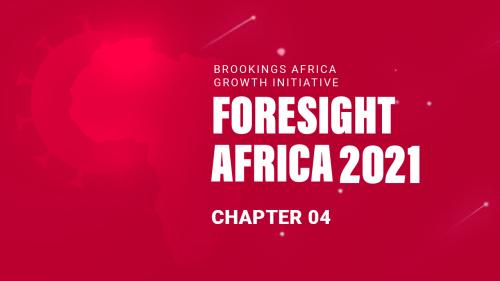Below is a Viewpoint from Chapter 4 of the Foresight Africa 2021 report, which explores top priorities for the region in the coming year. This year’s issue focuses on strategies for Africa to confront the twin health and economic crises created by the COVID-19 pandemic and emerge stronger than ever. Read the full chapter on private sector leadership.
 Late last year, after 20 years of investing on the African continent, Mara Phones opened the first two smartphone-manufacturing factories in Africa, first in Rwanda, then in South Africa. Our optimism about Africa and the decision to invest in the continent has always been premised on the fact that Africa is among the world’s fastest-growing consumer markets and has the necessary support structures for investments.
Late last year, after 20 years of investing on the African continent, Mara Phones opened the first two smartphone-manufacturing factories in Africa, first in Rwanda, then in South Africa. Our optimism about Africa and the decision to invest in the continent has always been premised on the fact that Africa is among the world’s fastest-growing consumer markets and has the necessary support structures for investments.
Despite the African continent’s macroeconomic conditions, which were exacerbated by the COVID-19 pandemic, Africa has fared well due to the urgent preventative action taken by individual governments to avoid the rampant spread of the virus. Although it is still early to assess, African economies seem to have withstood the anticipated devastating effects of the pandemic because of improved economic policies and the quality of investments on the continent. In short, this resilience shows that there are relevant investment opportunities in the region that can power post-COVID-19 economic recovery and resilience strategies.
As we shift the conversation from the pandemic and its impacts, we now look towards the future and assess post-pandemic opportunities that the African continent can explore in order to rebuild and diversify our economies. Importantly, COVID-19 has certainly exacerbated the region’s economic strain but is not responsible for all the economic challenges faced by the continent. In other words, when we think of post-pandemic opportunities we should not frame them as if every economic challenge faced by Africa is rooted in or is a result of the pandemic.
Furthermore, Africa is not a homogenous continent, and the impact of COVID-19 will be different for every country. Now, more than ever, Africa needs sustainable long-term strategies, and we need to start by assessing the priority areas of focus and initiating a shared sustainable economic recovery plan.
The African continent has an opportunity to build sustainable value chains by adopting strategies that demonstrate certainty, stability, and ease of doing business. To become more relevant in the global value chain, Africa’s post-pandemic opportunities and strategies need to advance the following priorities.
- Reconfiguration of global value chains: COVID-19 revealed to the world the risks associated with overly relying on a few global economic regions for the supply of goods and services. This revelation has presented an opportunity for Africa to recalibrate and achieve its ambitions of being self-sufficient by identifying trade opportunities—essentially becoming both the users and suppliers of goods and services. Indeed, Africa must move away from overly relying on imports and focus on supporting locally produced products in order to retain profits and support job creation and economy-building initiatives.
- Collaboration between regions: Weakened global economic growth will have an impact on trade with and within Africa, further providing the region with the opportunity to collaborate and leverage its scale and efficiency by both rethinking the fundamentals of partnerships among African countries and speeding up the implementation of the African Continental Free Trade Agreement. The facilitation of trade between African countries through policy harmonization will boost commerce and social reform by increasing the competitiveness of African products and services and creating global export opportunities and new export markets within the continent.
- Increasing digitalization: African countries that can galvanize their efforts towards digital resources will be better placed to attract investments and position themselves as future economic world leaders. African leaders need to refocus the energy and the urgency that have arisen from COVID-19 to rethink digital infrastructure, therefore avoiding further exclusion from the global economic value chain. Part of the COVID-19 recovery strategy must pivot towards infrastructure, as it will enable Africa to be self-sufficient.
COVID-19 has indiscriminately affected the whole world. No region, industry, or business has been exempted. As a result, private and public sector collaboration and partnerships have become even more critical and essential features of the African economic recovery strategies.




Commentary
Long-term strategies for an African recovery from COVID-19: A CEO’s perspective
February 4, 2021